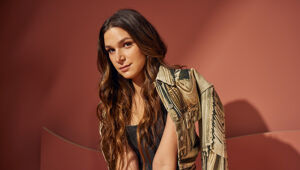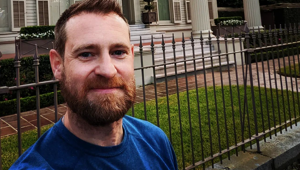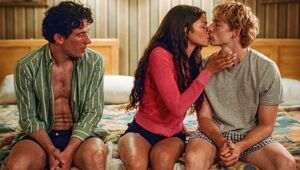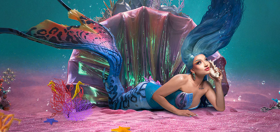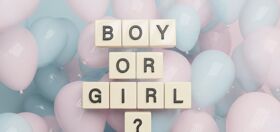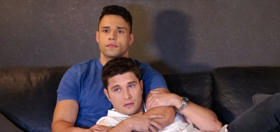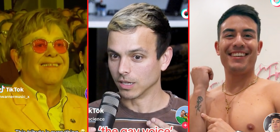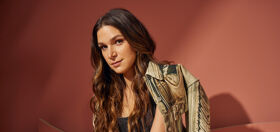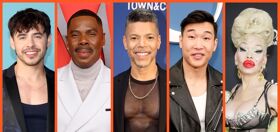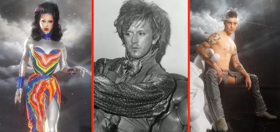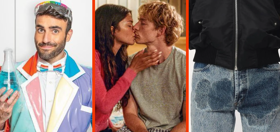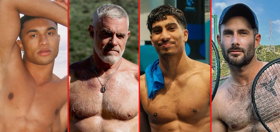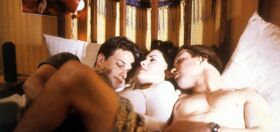
Kate Bornstein knows no bounds.
At 72, the classy, brassy transgender-non-binary activist has done just about everything, having worked as an author, playwright, sex hotline operator, essayist, performance artist, and above all, an activist for the LGBTQ community. Bornstein became a fixture of the American talk show circuit in the 1980s and 90s as one of the first out-transgender advocates, helping the country come to understand the differences between, gender, sex and sexual orientation. Recent years have seen Bornstein acquiesce to acting, taking on small roles in Saturday Church and the TV series The Blacklist.
Now Bornstein takes on her biggest role to date: that of Andrea, a trans-non-binary counselor in Two Eyes. The film plays the virtual Outfest Film Festival August 30.
Two Eyes follows three parallel narratives. In 1898 Montana, an artist named Dilhon (Benjamin Rigby) sets out to paint the countryside, and crosses paths with a group of “two-spirit” Native Americans; that is, gender non-binary people. In Barstow, California in 1976 a teen photographer Gabryal (Uly Schlesinger) meets a beautiful foreign exchange student, and the two develop an immediate passion for one another. In the present day Wyoming, a transgender man named Jalin (Ryan Cassata) comes to Andrea (Bornstein) for counseling. Of course, all three stories intersect in a significant way, as each provides a different insight into gender and sexuality.
How about we take this to the next level?
Our newsletter is like a refreshing cocktail (or mocktail) of LGBTQ+ entertainment and pop culture, served up with a side of eye-candy.
We caught up with Bornstein just ahead of the Outfest Film Festival. Directed and written by Travis Fine, Two Eyes plays there as the closing night gala on August 30.
How are you doing? How are you feeling in all of this?
As well as can be in these crazy, f*ck-*ss days. It’s complicated. That’s the first question everybody asks. My health is good as good can be. I’m 72, so everything is slowing down and breaking.
Oh lord.
It does. And that’s ok. I’m having a wonderful time of life despite that.
That’s good to hear.
Thank you. My partner Barbara Carrelles and I live in New York City, in East Harlem. Barbara was gifted a little house on the south shore of Rhode Island that she grew up in after her parents died. We were coming up here for our birthdays when everything hit the fan. So we stayed with our two dogs, two cats and our turtle. So that’s where we are. I’m not used to it yet. I’m a New Yorker; I love New York City. I love city life. It’s very different being here in the suburbs. Fortunately, my partner and I love each other very deeply. We’re coming up on our 24th anniversary.

Oh wow. That’s fantastic.
It’s crazy.
So how did the role of Andrea come to you?
Well I got an email saying “I’m working on a film and I want to talk to you about taking a part in it.” It was Travis [Fine]. I’d never talked to him before. I didn’t know him. He said, “I’m starting a parade. I want you to be in it. We’re going to take this parade to see how much ground we can cover with it.” Then he described the plot: the three stories and how they interweave. And I just went wow.
In writer’s terms, we talk about the “moral voice” in a work of fiction—the guide for the protagonist. I would argue that Andrea is certainly the moral voice in Jalin’s story. Quite simply, is it empowering for you as an activist to play a trans woman who also represents everything good?
Honestly, it brings tears to my eyes. Truly.
[Long pause]
Growing up there were transsexuals, transvestites and street fairies. That was it. Because I was middle class, I was on the road to “transsexual.” Then all of the definitions changed. All of the various identities grew out of it. And I never saw myself on screen when it wasn’t a psychopathic killer or a completely helpless victim.
Right.
Still, even if you look at this brilliant film Disclosure…
Made by your friend, Sam Feder. I loved it.
It’s just wonderful how many trans voices [the film includes], but not that many non-binary trans voices. That’s still a new concept in the world. And now in addition to tears I’m getting goosebumps.
[Laughter]
And now here’s a film, Two Eyes, where there’s more than one trans-non-binary voice. And to be the moral voice, as you say, the moral guide—and that’s a great way of putting it—was such an honor. Holy crap. And it was so hard to act, because I’m a very amoral person.
[Laughter]
I find that very hard to believe. But that brings up another question. You’re someone who has done almost everything—a writer, an essayist, a playwright, a talk show personality, an advocate, a phone sex operator. And I’ve noticed you’ve done more acting the past few years. This is also the most significant role I’ve ever seen you attempt. Did you hesitate at all to accept something so large?
No, it’s a thrill. You know how you hear mountain climbers want to climb the highest mountain? Or swimmers want to swim the most lengths of the pool? To have a part like this—as you say, I never have. I was like let’s do it. Then after you say “Oh boy,” and you sign the contract and join the union, you go oh God, what have I gotten myself into. I’ll never be able to do this. So yeah, it’s intimidating as hell. But you know, the love of the theatre, the stage, the screen and acting, in general, got me to say yes in the first place. Trusting Travis and my castmates, especially Ryan, with whom I share a lot of scenes…Ryan and I were both trained in the same school of acting. We’re Method actors. We just fell into each other’s arms, literally and figuratively. It was so easy with him.

Related: Legendary Trans Activist Kate Bornstein is Battling Cancer (And You Can Help!)
Wonderful.
Travis is the kind of director who gives you a direction and says “Use what you want, make up the rest as you wish.” Or he’ll say “No, use these words.” And he’ll be on the sidelines giving you side directions. That’s how I learned to act. So it felt comfortable. I trusted him. He’s a trustworthy guy. It wasn’t at all intimidating once we started.
I want to talk about Travis Fine, the writer/director here. He is a bisexual cisgender man. Did you advise him in any way about the trans storylines of the film?
The part he was offering me was, at first, a transgender woman who was a therapist and head of an LGBTQ youth center in Laramie, Wyoming. I asked if we could change her to a non-binary transwoman. And he said “Sure!” Then he just kept casting. His director of photography is also a non-binary transwoman.
I think the story of Dihlon McCarthy is more [Travis’] story. I don’t want to have any spoilers, but you know how you write something and there’s always yourself in it?
Always.
Look what he wrote. He’s not trans. So I think he was able to express himself more fully, sexually than he ever has before. And he trusted us. Travis is cisgender. He’s a guy, a man, and loves being one. But he didn’t fully understand at the time what it meant to be a transwoman. So there were tropes in the writing that you could see in Disclosure. And you’d go oh, no, no, no. We’re not doing that. And he would say “Why?” And we’d explain, and he’d go “Ok.” And then he would go change other stuff in the script based on that. He gets it. That was part of the basis of the trust we all had in him. He got what we were saying and ran with it. We just all started coming together. Before I knew it, I was on a plane to Montana and we were shooting.
That’s wonderful. It’s also encouraging that he had no ego about it, in a business known for elephantine egos.
Right? At first it was scary to say “We can’t say that.” For him to go “Ok, tell me why…” He wanted to learn. You can carry on a great conversation with him. He’s educated on trans issues now. He’s got it.

I want to ask about that a bit more. Recently, people have slammed movies like Milk or Bohemian Rhapsody for having straight actors in leading roles. They forget that the writers and directors are also queer. As an actor and a writer yourself, where is the balance? At what point are we hurting our stories more than helping them?
There’s no hard and fast guidance for this. It has to be a case by case basis. When you look at the heart of Two Eyes and you see it’s a story of trans blossoming, or more than that, of non-binary trans blossoming over time—if that’s the story in [Travis’] heart, part of him knows that story. If he’s willing to make the changes the way people who have lived that story want to make those changes, you go “You’re good with me.” I don’t know if that would have been possible in another film with another script. I hope I get a chance to find out.
We’ll have you back if you do.
Please.
One of the elements of the film that really intrigued me is the way the Native American notion of how the two-spirit, the “two eyes,” evolves over time, or at least means different things to different people. In a sense, that is the story of the evolution of queer identity. Do you feel like that evolutionary understanding reflects what is both beautiful and iconoclastic about LGBTQ people?
The fact that Two Eyes does cover different characters in different time periods over the course of a century shows how we’ve been there all along. When it comes to identity, a “two-spirit” identity, we’re very proud to say “Aha. The way the two-spirit person sees the world—I see the world in a similar way.” Look at that. Across cultures, I have a sibling right there. I have an ancestor. To say that as a queer person—that I have a story, I have an ancestor—is extremely comforting. I find this movie extremely comforting.
On the subject of evolving terms, here was a time when all LGBTQ people were lumped together under the auspice of being “gay.” Marsha P. Johnson described herself as a drag queen, a gay person, and a trans woman. Today, I think people would attribute the term gay to specifically cisgender people attracted to other cisgender people. Is there a danger in fracturing the community in the loss of this nuance—evolving terms?
That’s a real good one. I came out when the word “gay” was the umbrella term. I was gay. I marched in gay parades. It was a big deal to call something gay or lesbian, or later, gay, lesbian, or bisexual. Holy smokes. Then to finally add “trans” makes your heart overflow. But words…gay is a homonym. It sounds and is spelled exactly the same but it has different meanings. Gay then doesn’t mean what gay means now. The context for gay as an umbrella term has changed. It doesn’t fit. One thing I loved in those days is that everybody called themselves “queer.” We laughed at all the letters. Now it’s important that there is a letter for you and me. That’s the context of the world today, and it will change. The trick is to change with it. If you’re not changing with it, there’s a lot you need to learn unless you want the world to pass you by. Which it will.

Do you think that also speaks to the issue of us just now recovering our history as queer people? We’ve been erased for so long in so many different ways?
Sure. Let’s go back to the film which is non-binary identity. The idea today, for the most part, is that non-binary is a new identity. And it’s not. There have always been people that say “I’m not a man, I’m not a woman either.” There have always been people like that. But we’ve never had a piece of art to point to and say “Like that.” Now we do.
So what are your future ambitions? Do you want to keep acting? Larger parts?
Yes, please. I don’t know about larger parts. I want to do parts as well written and conceived as this one in Two Eyes. I want that—challenging roles. And if you want me to do a large part, twist my arm. I want to do more acting for sure. And I’m working on a new book—my best title yet: Gender-Just for the Fun of It.
[Laughter]
The subtitle makes up for it: Compassionate Gender Strategies for Divisive Times.
Fantastic.
The fact is—going back to where we started—I’m old. I hope I get a chance to do all that. Given coronavirus, I have to be a lot more careful now. I live in the upper 1% of people likely to get coronavirus bad if I do get it. It’s weird watching the film now, when we’re all masked and social distancing. Seeing all the touch, the immediate gratification of sex, the joy that goes on—someone’s going to have make one about this day and age.
Pray for a new President.
Golly, there’s what it comes down to. Vote, vote, vote. I know Biden & Harris aren’t perfect, but the fact that they’ll oust Trump trumps everything. I’m totally behind mom & dad—Biden & Harris.
Two Eyes plays the virtual Outfest Film Festival August 30.


